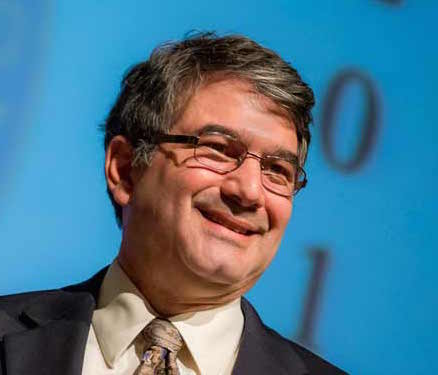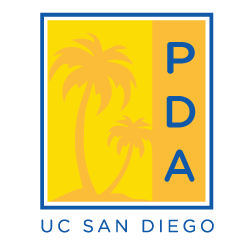
Mark Lawson, Ph.D.

- Interview Overview
Interview Overview
Interviews and Editing by: Alexandra Bortnick
1. Where did you attend your undergrad and graduate studies?
B.S., San Diego State University, Microbiology
Ph.D., UC Irvine, Biological Sciences, Thesis on Picornavirus protein processing
Postdoc, Salk Institute, UC San Diego, Neuroscience and Endocrinology
2. Please describe your research as you would to a general audience.
Our lab studies the synthesis and secretion of the reproductive hormones LH and FSH, which control fertility in both males and females. We are specifically interested in how the pituitary gland is stimulated by the brain to produce LH and FSH, and how diseases that affect fertility cause changes in their production.
3. Please explain how you realized you wanted to become a professor.
I had a good job in biotech at the time the opportunity to come to UC San Diego in a faculty position opened up. I realized that, if I didn’t at least try to make it work in academia, I would always second guess that choice. Having established a professional network, I figured that if I didn’t make it, I could return to industry and be satisfied with knowing the answer for me personally. I’m still here so I guess it is working out so far. The lesson from that is that having a good network can give you the confidence needed to take risks.
4. Apart from your graduate and postdoctoral training, what were specific skills or factors that helped you acquire your current position as a faculty member?
Working in biotech taught me a tremendous amount about experimental design, rigor, and reproducibility. Those critical skills have been essential to my success in academia.
5. Please list some of the most striking similarities and differences between your postdoc and your faculty position?
Similarities - The love of science. Waking up and looking forward to get to work. Feeling lucky because I have the privilege to work at an amazing institution during a remarkable time in history. For me that has always been humbling yet inspirational. As you can guess, I am not a cynical person.
Difference - The feeling of responsibility for the success of others. Students, postdocs, and staff rely on you for guidance, mentorship, and support. I didn’t get any training in that so it was a challenge to get up to speed. Also, thinking long term about projects and questions. I get interested in so many things, so needing to focus on good questions and how to answer them is an ongoing challenge.
6. What were the biggest challenges you faced when you transitioned to your faculty position from a postdoc?
Because I had an interlude in biotech it might have been a bit different than for most. I had a little experience figuring out how to manage people and prioritize work and that was helpful. But facing the challenge of having to actualize the ideas that I had put forth in my first grant was daunting. Going from paper to practice. I remember thinking, “Wow, I actually have to do this stuff!” Luckily, I did. Another was learning and understanding about how the institution really worked, what were its priorities, how I fit into the grand scheme of things, and how to be purposeful in the things you choose to do both in the lab and as a member of a larger organization. It was all very much unknown to me when I started, and I realize now that early mistakes can be costly for the progress of one’s career. I got lucky, but I recognize some of that really was luck.
7. What has been the biggest challenge you’ve faced in your career so far and how did you overcome such a challenge?
Facing the challenge of funding my research program. I had been told that renewing the first R01 is the real test of ability and it truly was for me. It was not easy and there were times when I was literally sick to my stomach after getting reviews back and feeling that I could never rise to the occasion and respond with a better proposal. Good mentors and peers as well as support from my Chair and department helped me through that.
The other is balancing family life and work life. A research career demands a lot from you, and the culture is modeled after that of a mendicant monk rather than a paterfamilias, or rather partner-familias. Sometimes you have to bend the culture around you to make it work, and sometimes you have to acquiesce. I have still not figured out the perfect balance, nor do I know anyone who has.
8. Knowing what you know now, what recommendations do you have for postdocs to best prepare them for the responsibilities of a faculty position?
Do a postdoc at UC San Diego and commit to the EPIC training program! I have championed this re-visioning of the postdoctoral training experience largely by thinking about my own experiences in making two different career choices, biotech and academia, and by the experiences of trainees in my lab and of many others across disciplines. No matter the discipline, there are many common challenges. Good training can smooth the path into whatever career you choose. Validating the variety of career paths, and providing the appropriate support to make you successful in those choices is my goal in my role as Faculty Director of Postdoctoral and Visiting Scholar Training and Education. That’s a mouthful, isn’t it?
9. Do you have any other advice for postdocs who want to pursue research inside or outside of academia?
A few things. Do what you love. There are always hard days, no matter what career you are in or what path you take. Loving what you do is what motivates you to get up when you are down and to take the next step on the journey. Learn what you can and acquire as many tools as you can while in training. Don’t underestimate the value of being trained as a scientist, which in many ways is being trained as a problem solver. That skill is useful in many places beyond academia. Finally, be a part of the community and love the people around you. Everyone needs to be mentored and can be a mentor, even if in a small way. We all learn and benefit from our experiences and from those around us. If we don’t share those, then we are losing out on that shared knowledge and chance to progress. Even though we are in a competitive and stressful world, there is a lot of good being accomplished and everyone has something to contribute. So I guess it all boils down to one thing, and the Beatles said it best…All you need is Love!
